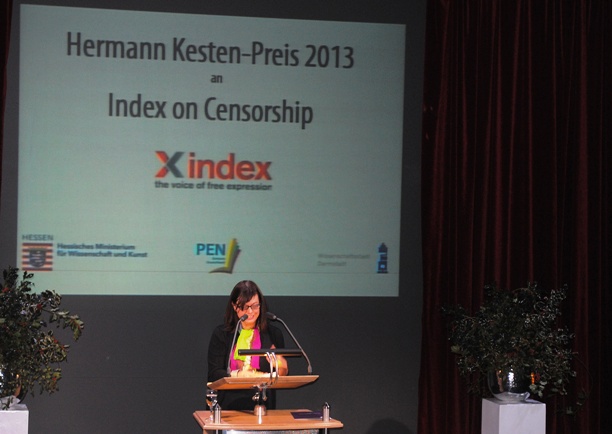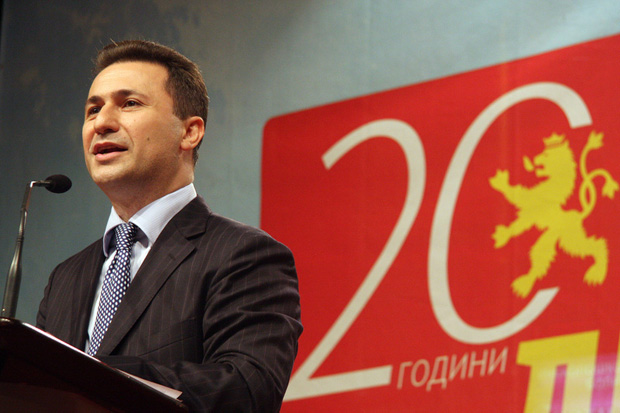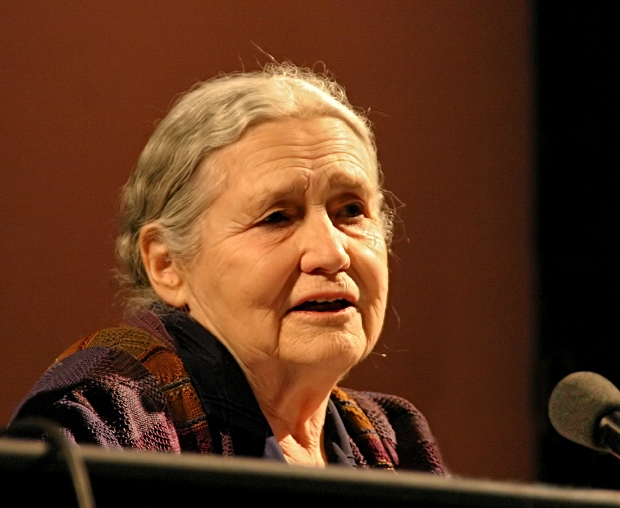19 Nov 2013 | About Index, News, Press Releases
 Index on Censorship was in Darmstadt, Germany, last week to receive the prestigious Hermann Kesten literary prize from German PEN.
Index on Censorship was in Darmstadt, Germany, last week to receive the prestigious Hermann Kesten literary prize from German PEN.
The prize is given in honour of Hermann Kesten, the German novelist, who left Germany for Paris in 1933. From Paris, Kesten helped exiled and banned writers get published.
Previous recipients of the prize include Gunter Grass and Harold Pinter, and last year’s winner Belarusian journalist Irina Khalip. Khalip, who was not able to attend the ceremony last year as she was under house arrest, was in Darmstadt to present the award to Index. In her speech introducing Index, Khalip spoke of her personal connection with Index, as well as its history working with exiled and imprisioned writers. She said: When in prison Natalia (Radzina, of opposition website Charter 97) and I did not know that in 2011 together with all political prisoners in Belarus we were awarded the special Freedom of Expression prize. Index on Censorship did everything so that we were not forgotten in prison and were released as soon as possible. For instance, together with Free Belarus Now and the Belarus Free Theatre, Index persuaded several European banks to stop trading Belarus government bonds to prevent Europe from trading with the dictator. This made a big difference in persuading the regime it could not withstand international pressure forever.
Rachael Jolley, editor of Index on Censorship magazine, received the prize on behalf of the organization from the president of German PEN Josef Haslinger. She told the audience “ Index has taken aim at many authoritarian rulers and their regimes and made clear that contrary to what many may have thought and hoped for censorship is not over.”
“Index has sought, too, to keep the public aware of the pressure on journalists all over the world, who were struggling to do their jobs in difficult circumstances, often where their lives were in danger.”
19 Nov 2013 | Europe and Central Asia, Macedonia, News

The government of Prime Minister Nikola Gruevski has been heavily criticised for the state of media freedom in Macedonia (Image Toni Arsovski/Demotix)
Media freedom in Macedonia has been deteriorating for some time. The latest case is the arrest of Zoran Bozinovski, the owner of website critical of the government, Burevesnik on espionage charges. Below, Tamara Causidis, President of the Trade Union of Macedonian Journalists and Media Workers and Dragan Sekulovski, the Executive Director of Association of Journalists of Macedonia, chronicles the challenges facing the free press, in their submission to the upcoming International Federation of Journalists conference in Kiev.
—
The media business in Macedonia has been increasingly under attack over the past few years. The EU and the US State Department, as well as renowned non-governmental organisations like Freedom House and Reporters Without Borders, have all called attention to the decline of media freedom in the country. The challenges most often highlighted include imprisoned journalists, restrictive draft media laws, the government’s large advertising share, the lack of transparent ownership, and the polarisation of the media along lines of political and business affiliation. In light of this, freedom of the media and freedom of speech have been marginalised.
Macedonia has almost 200 media outlets, but unfortunately, that does not make the situation better. They all compete in a small, distorted market, covering just over 2 million citizens, where they cannot survive financially unless they align their interests with the governing parties and politically connected, large businesses. Apart from state media, the vast majority of the country’s press is in private hands. However, the government come out top among the 50 biggest advertisers in the country in 2012. The latest European Commission report raised this as a serious concern, and the DG Enlargement report of June says that at least 1% of the annual national budget (20 million Euros) is invested in media outlets through government campaigns and advertising. This highlights the authorities’ huge influence in the media sphere. Bearing in mind that there are no criteria for how to distribute these funds, “governmental friendly” media outlets are favoured over others. Professionals are fired and people with personal integrity are replaced by obedient mouthpieces, while a huge number of journalists are living in professional insecurity. Behind the veil of “economic reasons”, critical media is vanishing.
One of the most striking example of the situation Macedonian media finds itself in, took place on 24 December last year. Journalists reporting on the parliamentary session were expelled from Parliament by security forces without any reasonable explanation. The Association of Journalists of Macedonia (AJM) used all national legal measures to fight this, but so far no public official has been held liable for this breach of Article 16 of the constitution, which guarantees citizens the right to objective information. The next step would be submission of an appeal to the Court in Strasbourg.
In April the government announced a draft media law, now in its final stages within Parliament, which has the potential to further negatively affect media independence and freedom of expression. International and local organisations are concerned about the same issues regarding the bill – the intention to have one regulator for all types of media and the powerful role of this regulator, the issues concerning political independence, sustainable financing and high and disproportionate fines for the media, as well as the messy attempt to adopt definition of a journalist. The main Council of Europe, OSCE and AJM recommendations have not been accepted. In fact, the latest version of the law was updated with amendments which makes the text even more restrictive the before. For instance, it envisaged that authorities to decide which national association of journalists is legitimate, and will have the right to nominate a member to the council of the regulator and the public broadcaster.
In October 2013 Macedonia became the only country in south-east Europe with imprisoned journalists. Tomislav Kezarovski, from the daily Nova Makedonija, was sentenced to four and a half years in prison for in 2008 revealing the identity of a protected witness in a murder trial. The witness recently testified that he had given false evidence against the accused killers. The Trade Union of Macedonian Journalists and Media Workers (SSNM) and AJM organised two protests in front of court in Skopje, raising the issue in the international community, but despite this Kezarovski was sentenced on October 21.
It should also be noted that at the time, he was investigating the mysterious death of prominent journalist Nikola Mladenov, founder of the weekly Fokus and one of the biggest activists for press freedom in the country. AJM is taking daily initiatives to raise the visibility of this case, to try to convince authorities that this sends terrifying message to all journalists and endangers freedom of press even more.
Finally, many colleagues in the media cannot rely on any of the basic rights guaranteed by the Labour Law. They are working without contracts, insurance, paid vacation, overtime hours and sick leave, and minimum wage is not regulated. There aren’t any internal rules or statutes defining the rights and obligations of owners, editors and journalists, and there are instances of both direct and indirect bans for organising into workers unions. The journalists themselves are barely educated about what a union is and how they can organise through it. In the face of fierce criticism from AJM, the government has developed the Macedonian journalists association, designed not only to diminish critics and open confrontation but also to impose artificial support for the proposed media laws.
This text is drafted based on a draft report on the media situation in Macedonia by Tamara Causidis, President of the Trade Union of Macedonian Journalists and Media Workers and Dragan Sekulovski, Executive Director of Association of Journalists of Macedonia. It will be published at the upcoming conference organised by the International Federation of Journalists in Kiev.
This article was originally published on 19 Nov 2013 at indexoncensorship.org
18 Nov 2013 | Magazine, News

It is an astonishing fact that Zimbabwe, after 20 years of a rule that has starved libraries and schools of books, is full of people who yearn for books, who see them as a key to a better life, and whose attitude is similar to that of people in Europe and the USA up to 50 years ago who read because they agreed with Carlyle’s dictum ‘the real education is a good library’ — and aspired to be educated.
There are libraries and libraries. Some I am involved with would not be recognised as such in more fortunate parts of the world. A certain trust sends boxes of books out to villages which might seem to the illinformed no more than clusters of poor thatched mud huts, but in them may be retired teachers, teachers on holiday, people with three or four years of education who yearn for better. These villages may have no electricity, telephone, running water, but they beg for books from every visitor. Perhaps a hut may be set aside for books, with a couple of shelves in it, or shelves or a trestle may be put under a tree. In a bush village far from any big town, or even a little one, such a trestle with 40 books on it has transformed the life of the area. Instantly study groups appeared, literacy classes — people who can read teaching those who can’t — civic classes and groups of aspirant writers.
A letter from there reads: ‘People cannot live without water. Books are our water and we drink from this spring.’
An enterprising council official in Bulawayo sends out books by donkey car — ‘our travelling library’ — to places where ordinary transport cannot go, because there are no roads, or roads that succumb to dust or mud.
A friend of mine, known to be involved with organisations that supply books, was approached .by two youths in a bush village near Lake Kariba who said, ‘We have built a library, now please give us the books.’
The library was a shelf in a little lean-to of grass and poles, but the books would never succumb to white ants or the book-devouring fish-moth, because they would always be out on loan.
A survey was made in the villages and it turned out that what these book-starved people yearn for are romances, detective stories, poetry, adventures, biography, novels of all kinds, short stories.
Exactly what a survey in this country would reveal — that is, among people who still read.
One problem is that these people do not know what is available that they might like if they tried. The Mayor of Casterbridge was a school set book one year and was read by the adults, and so people ask for books by Hardy.
The most popular book everywhere is George Orwell’s Animal Farm. Another that has queues waiting for it is World Tales by Idries Shah, and it is not only the tales themselves, but the scholarly footnotes attached to them which people enjoy. They say of a story, perhaps from the Sudan or the USA, ‘But we have a story just like that.’
One problem is that people, hearing of this book hunger, at once offer to donate their cast-off books. These are not always suitable. Donations would be better. Book Aid International, based in London, sends books out to book-starved countries.
This article was originally published in Index on Censorship magazine, March 1999.
Click here to subscribe to Index on Censorship magazine, or download the app here
18 Nov 2013 | Palestine
A Palestinian news agency closed down in the Gaza Strip for allegedly fabricating reports regarding Hamas and their support for pro-Morsi Egyptian Islamist groups is to reopen after four months.
The decision to allow work once again at the offices of Ma’an News Agency, the largest independent TV, radio and online media group in the West Bank and Gaza Strip, was the result of a meeting between the Hamas leader President Haniyeh and those of Palestinian factions on Saturday. According to Khaled al-Batsh, leader of the Islamic Jihad Movement, the meeting was called by Haniyeh to deliberate issues in the Gaza Strip, including potential reconciliation among Palestinian political factions. The Palestinian president Mahmoud Abbas’s Fatah movement was not represented at the meeting.
A spokesman for Hamas, Ehab Ghissin, stated that Haniyeh “gave his instructions for the Ministry of Information to open the agency’s bureau” as long as Ma’an abides by professionalism and accuracy in its work.
The office of Ma’an was closed down in July after publishing reports suggesting Hamas was involved in supporting terror groups opposed to Egypt’s new regime. Citing Israeli sources the article stated the Hamas government gave refuge to fugitive leaders of the Egyptian Muslim Brotherhood in a Gaze hotel. After the meeting President Haniyeh spoke of the importance of a positive relationship between Egypt and Palestine, emphasising that Hamas is a national movement that does not depend on external organisations.
The decision to reopen the news office in Gaza was welcomed by Ma’an General Director, Raed Othman. “Ma’an aims to provide its media services to all Palestinians everywhere,” he said, adding that the news organisation will attempt to increase its activity in the area in the coming weeks.
The Saudi Arabian news channel Al-Arabiya was also shut down for the same reason and at the same time as Ma’an. Despite discussion during Saturday’s meeting to reopen Al-Arabiya too, the organisation remains closed in the Gaza Strip. The news channel has openly stated it was in favour of the removal of President Morsi from power.
 Index on Censorship was in Darmstadt, Germany, last week to receive the prestigious Hermann Kesten literary prize from German PEN.
Index on Censorship was in Darmstadt, Germany, last week to receive the prestigious Hermann Kesten literary prize from German PEN.

